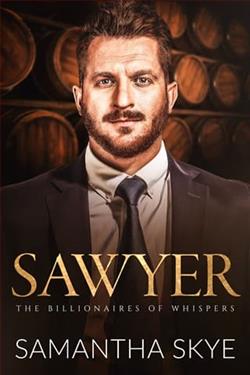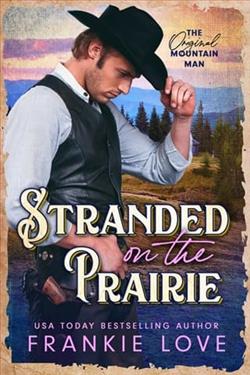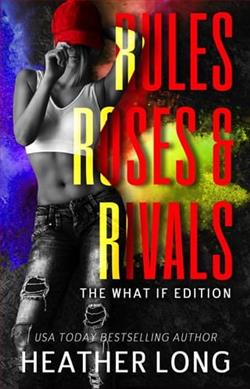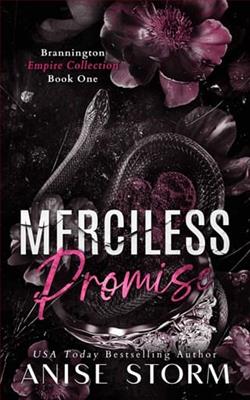Page 3 of Bloody Bargain
Waiting was the worst part, and there was nothing to do other than sit. The mug against my cheek was hot, melting the chilly tip of my nose while I lounged an elbow on my knee. My nose was always the first thing to get cold and the last to thaw.
I inspected the bump of Matthew’s nose from beneath the towel I’d draped over his face. His nose had been tall like mine, but not as thin or snubbed. He’d had strong features, possibly Gallic, considering the curl in his hair. Stubble dusted his chin like gold-spun thread glinting in the light of the candles.
I rolled restlessly on my hips, adjusting the little potato crate that ricketed back and forth on rusty staples.
Up to the kill, I always felt a sense of duty and purpose. The knife would plunge through flesh and bone, my conviction with it. Then shock would strike their eyes, red blood pool from the wound, and they would crumble. Weak, confused, often already gone. An eternal life, snuffed out by a young woman with a chilly nose and sunken eyes.
Pangs of uncertainty followed the rush of the kill. A moment felt like an hour. Had I been stalking the wrong person all this time? Some were so misleading. A grandmother in a summer cottage last May, tea and biscuits on her wrought iron garden table. A school boy of about ten, yellow backpack slung over one shoulder, asking to play hopscotch with the pretty American… After the high wore off, I always wondered if I was beginning to see the signs because I wanted the rush and punishment more than I cared for the certainty.
I slid Matthew’s sweater up my forearm to check the time on the green glowing face of my digital watch. An hour and thirty-three minutes had passed. It had felt like limbo in the howls of the storm, unable to see beyond the black oil of the rain on the windows.
I dragged the towel aside with the blood-soaked toe of my sock, my knee bouncing with impatience. Matthew’s mouth was black, his eyes clouded with death. His skin had swelled in the fine lines of age and was devoid of color around his cheeks and eye sockets. The eyeballs were beginning to collapse already, and the wound in his neck was rotted through at the trachea and nape, softening into the consistency of warm putty.
I sighed with relief and stood, pacing the tiny cottage to ease the pressure cooker in my chest.
Once the fear had worked its way out of my veins, I leaned against one of the tighter window panes, thankful for the bite of cold seeping through the old single-pane glass. I would wait out the storm in Matthew’s cottage. I would wait for his blood to deteriorate into dirt, for his bones to grind themselves into ash, and his hair to stiffen into dry grass.
And in the meantime, I would sleep.
?
The morning was groggy, what with the wind having fallen flat and the clouds hanging low amongst the hills. The sky stared down at me with her milky eyes, holding her breath. I felt watched, and the wall of white that surrounded the heathland unnerved me where I sat bundled in a thick wool comforter on the bed, my nose pressed against the window.
The old woman from the year before came to mind, foggy blue gaze filled with cataracts. There had been a reminder on a calendar of English gardens by the door that she was having them removed three days after my visit. She’d been my first after hopping the pond. I’d shook all over as I pulled the knife from my boot. She hadn’t been like the ones in America, all bar hoppers and sex workers. No, the old woman had been a leap of faith.
Pushing off the covers, I welcomed the attack of cold. It woke me up faster than an alarm clock or coffee. I groaned at the thought.
What I wouldn’t give for instant coffee. It wasn’t hard to find, but Matthew had none on his shelves.
The one-room cottage was beyond damp, the corners of the ceiling dark with rot from a thatched roof that should have been replaced decades ago. I wriggled my toes, miraculously warm in a fresh pair of Matthew’s woolen socks. That was the key, I realized. If my socks were slightly too large they’d trap in the heat. I would remember that. My feet had been numb since I came to Wales.
I lifted my hands to the grimy light of early morning, brushing off the dark soil that covered my borrowed clothes and hands, now collecting on the bed. Matthew’s blood had been reduced to dirt as fine and nutrient-rich as fertilizer. I rolled out of bed and brushed the dirt out of the sheets as best I could, smacking my knees and turning my socks inside out, ruffling out my hair. It was everywhere.
Shocking, I know.
Hair a tousled mess, big sweater cuffs fisted in my cold fingers, I stared down at Matthew’s remnants numbly. I skirted around the large pile of fine gold sand and dirt to grab my painkillers and a fresh bottle of water from my duffel. Straw dotted the mound, unnaturally curly as if it had been coiled around a hot iron.
“That’s new,” I mumbled to myself, nudging a dry, papery tendril with my toe.
The smell of putrefaction lingered like a dead animal in the yard, just strong enough to ruin the taste of food. I scraped my wet clothes away from the bottom of the door and cracked it open. It helped, even if every inch of my skin felt numb and stiff as a result.
Stretching, scratching my dirty hair, I rummaged through Matthew’s things by the light of day. I stuffed the rest of his socks in the top of my bag, even considering the ones he’d been wearing. I wasn’t desperate enough for that, though, and didn’t have the space anyway. The potato crate in the corner held some raw vegetables, a couple of citrus fruits, and half a log of hard salami. I bypassed it, heading for the canned food on the shelves. There were baked beans, herring filets, mince beef in gravy, and something called a chicken paste…
I wasn’t a picky eater, so I started with the beans and herring. I shoved the herring down my throat to avoid my tastebuds while taking the time to warm up the beans and another mug of tea.
I was about to polish off the tin tray when a thunderous thump reverberated off the window closest to me. I jumped, sloshing fishy water down the front of Matthew’s sweater.
“Shit,” I hissed, brushing the front with a grimace. Holding the cable knit away from my skin, I examined the cracked glass, beads of water and a delicate smear of blood lacing through the splintered pane. It splintered again when I poked it, smearing the red droplets like specimens sandwiched in microscope slides.
The cracked glass blurred as I refocused on the little shed out back. I’d forgotten about it as soon as I was out of the rain. Now that I got a look at it in the murky morning light, its age was showing. Chances were it was an outhouse with a little storage cupboard and some tools. There was an iron bolt on the door, grown black and craggy from the constant rain.
The structure leaned precariously, some boards standing completely on their own, separated from the others or kicked in at the bottom where the rot had eaten through the planks until they were pulp. But it had a solid roof, one that looked far too heavy for the wobbling collection of splintered boards beneath it. It shouldn’t have been standing, as far as I could tell.
I was more focused on what was inside than how it was standing, though. Plenty of old buildings in the United Kingdom defied the laws of physics. But how often would I come across supplies in the heathland? I’d combed through the cottage, which had few comforts I was interested in exploiting. No running water, no clothing in my size, no other packaged foods. It would be negligent to overlook the shed, no matter how rundown it seemed. There could be hunting supplies, knives, tarps, hiking cleats, more canned foods…
At least, a girl could dream.
I slid my boots back on with a pained groan. They squished around my socks, cold as ice. I opened the front door, noticed the keys by the frame, and took them with me out into the wind as I stuffed my chipped knife in its homemade leather sheath at the small of my back.















